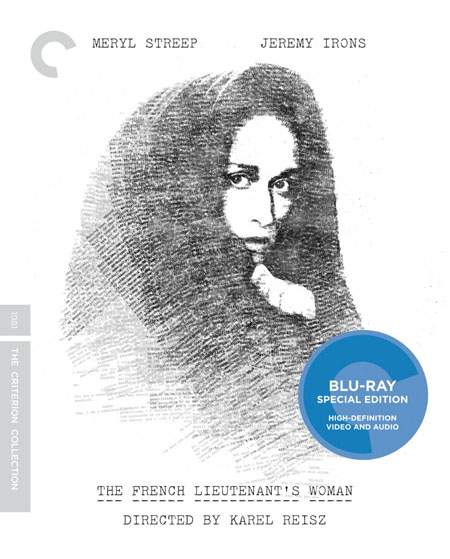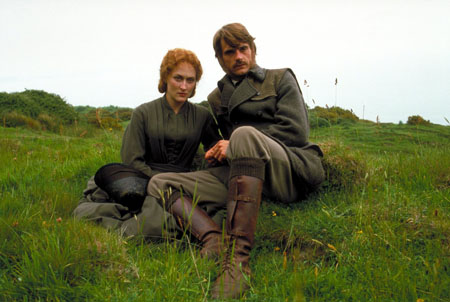
“THE FRENCH
LIEUTENANT’S WOMAN†(1981; Directed by
Karel Reisz)
(The
Criterion Collection)
“PARALLEL
OBSESSIONSâ€
By Raymond Benson
John
Fowles’ 1969 novel, The French
Lieutenant’s Woman, was a literary sensation, a best-seller, and a work
deemed “impossible†to film because it broke conventions and played with
narrative structure and point of view. And yet, there were several attempts in
the 70s to adapt the difficult Victorian story to something cinematic.
Apparently Dennis Potter took a shot at writing a screenplay at one point, but
it was playwright Harold Pinter who cracked the problem and presented the tale of
obsession, infidelity, and shame as two parallel stories—one in the Victorian
past, as in the book, and one in the present, dealing with the actors making the film we’re watching.
It was a unique and original approach to the material. With Karel Reisz at the
helm, the film adaptation became a critically-acclaimed art house delight.
Reisz,
a Czech director working in England, was at the forefront of the British New
Wave of the 60s with such pictures as Saturday
Night and Sunday Morning, Morgan!,
and Isadora. He brilliantly realizes
Pinter’s script with the help of the gorgeous cinematography by the great Freddie
Francis and the superb performances by Meryl Streep and Jeremy Irons. It was
Streep’s first starring role (she had previously held supporting parts and won
her first Oscar for Supporting Actress for Kramer
vs. Kramer) and it earned the actress her first Oscar nomination in the
Leading Actress category. For many, especially in the U.S., this was the first
time Irons was seen on the big screen (he had previously done much work for
British television and had a small part in one feature film). Narratively, it’s
Irons’ movie—he plays the protagonist—but it is definitely Streep, with her
hauntingly quiet portrayal of Sarah, the fallen woman, who leaves an indelible
mark.
The
parallel stories follow illicit love affairs. In the present, actors Mike
(Irons) and Anna (Streep) are making a movie called The French Lieutenant’s Woman. Both are married to other people,
but they have an on-location affair while filming in West Dorset, England. Coincidentally,
the characters they play in the movie—Charles and Sarah—have a scandalous
affair in the same setting, but in the Victorian era. The point of the picture
seems to be that nothing has changed since the late 19th Century in terms of
morality, social mores, and how misplaced passion can wreck a life. Sarah is a
mysterious outcast in the seaside town of Lyme Regis, the subject of much gossip
as being the “French Lieutenant’s Whore,†i.e., she had an adulterous
relationship with a married, visiting French soldier. Charles is a
paleontologist working in the village; he is engaged to marry a well-to-do
local girl, but he unwittingly becomes obsessed with Sarah. This, of course,
leads to the man’s ruin. In both cases, the aftermath of the affairs leave
devastations... or do they?

In
Fowles’ novel, the consequences of Charles’ and Sarah’s affair is played out in
three different endings. It is up to the reader to decide which is the most
plausible—or morally acceptable. For the film, Pinter has twisted this conceit
into the two analogous storylines with dissimilar outcomes. Very clever indeed.
Perhaps Pinter’s script—which was nominated for an Adapted Screenplay Oscar—is
the real star of the picture.
Besides
the Oscar nods for Streep and Pinter, the film was nominated for Art Direction,
Costume Design, and Film Editing.
Thought-provoking,
moody, beautifully shot, brilliantly written, and exquisitely acted, The French Lieutenant’s Woman is ripe
for rediscovery as an important piece of British cinema from the early 80s.
The
Criterion Collection does its usual bang-up job with a new 2K digital
restoration and an uncompressed monaural soundtrack. The images look marvelous.
Reisz’s attention to detail in the period setting is a feast for the eyes.
Supplements
include new interviews with Streep and Irons, editor John Bloom, and composer
Carl Davis (whose score is evocative and sublime); a new interview with film
scholar Ian Christie about the making and meaning of the film; an episode from The South Bank Show from 1981 featuring
Reisz, Fowles, and Pinter; and the theatrical trailer. The essay in the booklet
is by film scholar Lucy Bolton.
While
Chariots of Fire may have taken the
Oscar gold for 1981, for me the finest British picture that year was The French Lieutenant’s Woman.
CLICK HERE TO ORDER FROM AMAZON